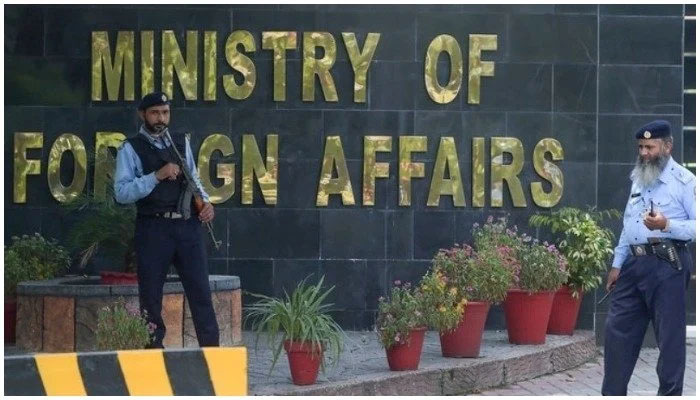
ISLAMABAD: Pakistan has categorically rejected the report of the so-called ‘delimitation commission’ for Indian occupied Kashmir (IoK).
The Indian Charge d’Affairs was called to the Ministry of Foreign Affairs Thursday and handed over a demarche conveying the Government of Pakistan’s categorical rejection of the report of the so-called ‘Delimitation Commission’ which was aimed at disenfranchising and disempowering the Muslim majority population of Indian occupied Kashmir (IoK), a press statement by the Foreign Office stated.
The Indian side was conveyed that this entire exercise was “farcical and had already been rejected by the cross-section of political parties in IoK”. Through this effort, India only wanted to lend ‘legitimacy’ to its illegal actions of August 5, 2019, the FO statement read.
It was emphasised that the ulterior motive of the Indian government was evident from the fact that, under the garb of so-called delimitation, the representation of Muslims in the re-designated constituencies had been reduced to their disadvantage.
“This shattered the rationale pushed by the Indian government that the ‘delimitation effort’ was aimed to ‘empower’ the local population. However, in reality, the new electoral boundaries would further disempower, marginalise and divide the people of the occupied territory. It would only pave the way for installing yet another puppet regime backed by the BJP-RSS combine” the statement read.
It was underscored to the Indian Cd’A that the Jammu and Kashmir dispute was an internationally recognised dispute and a long-standing item on the agenda of the UN Security Council.
The FO statement emphasised that any illegal, unilateral and mischievous attempt by India to allow disproportionately higher electoral representation to the Hindu population to the detriment of the Muslim population, is a mockery of all norms of democracy, morality and India’s obligations under the UN Security Council Resolutions and international law.
It was also stressed that the Indian government must refrain from bringing about any illegal demographic changes in the occupied territory, stop forthwith its oppression in the IoK, and let the Kashmiri people determine their own future through a free and fair plebiscite under the UN auspices as enshrined in the relevant United Nations Security Council resolutions.
The dispute
A day earlier, India published a new list of redrawn political constituencies for the former state of Jammu and Kashmir, giving greater representation to the Muslim-majority region’s Hindu areas and paving the way for fresh elections.
The government said a delimitation commission had finalised 90 assembly constituencies for IoK, excluding Ladakh, with 43 seats for Jammu and 47 for Kashmir. Earlier, Jammu had 37 seats and the Kashmir valley 46.
The commission, whose report has been rejected by IoK’s Peoples Democratic Party, said it had been difficult to accommodate competing claims from various sides, citing in a statement the region’s “peculiar geo-cultural landscape”.
Indian Home Minister Amit Shah said in January that elections would be held in IoK soon after the delimitation process was completed. He also promised to reinstate its statehood once its “situation became normal”.
The Jammu Kashmir National Conference, which has governed the region, said it was studying the implications of the move that has been championed by Modi’s Bharatiya Janata Party (BJP).
“No amount of gerrymandering will change the ground reality, which is that whenever elections are held the voter will punish the BJP and its proxies for what they have done to IoK over the last 4 years,” the National Conference said on Twitter.
The BJP said on Twitter it would change IoK’s image and future for the better if voted to power.






